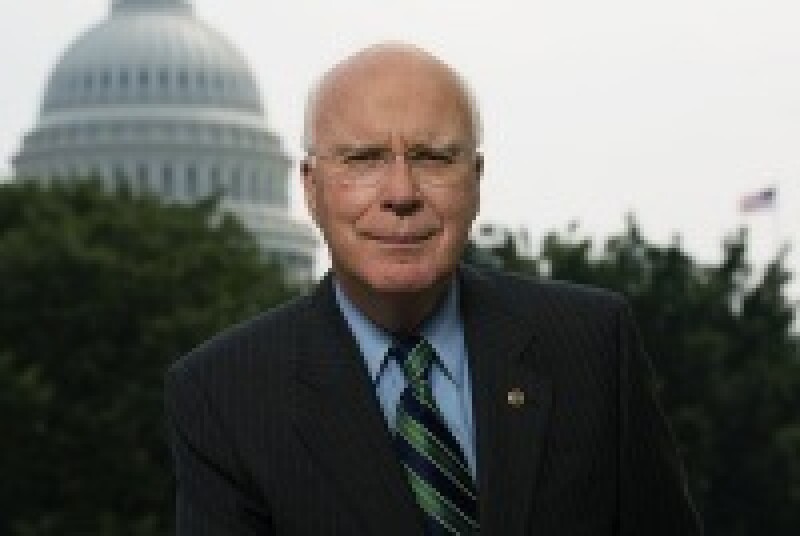The Patent Transparency and Improvements Act was withdrawn from the Senate Judiciary Committee yesterday by the committee’s chairman, Patrick Leahy. Leahy introduced the bipartisan bill in November last year. In December, the House of Representatives passed the Innovation Act in a 325-91 vote.

In a statement, Leahy (right) said he took the bill off the Senate Judiciary Committee agenda because there was “not sufficient support behind any comprehensive deal”.
“I have said all along that we needed broad bipartisan support to get a bill through the Senate,” he said. “Regrettably, competing companies on both sides of this issue refused to come to agreement on how to achieve that goal.
“We can all agree that patent trolls abuse the current patent system. I hope we are able to return to this issue this year.”
Matthew Tanielian, executive director of the Coalition for Patent Fairness, said in a statement that he was “stunned and disappointed” by Wednesday morning’s announcement.
“Patent trolls and their special interest allies are the only winners today,” he said.
Groups including the EFF, The Internet Association and Patent Progress also issued statements saying they were shocked by the news.
Signs of trouble
There were signs the bill was in trouble in March, when entrepreneurs, investors and inventors wrote to Senators Leahy, Chuck Grassley, John Rockefeller and John Thune, asking them to "push forward and support comprehensive legislation that tackles the growing problem of patent trolls.”
In a separate letter that month, 17 US senators urged Senate majority leader Harry Reid and minority leader Mitch McConnell to "move swiftly to advance necessary reforms to address abusive patent litigation." At the time, sources told Managing IP patent reform advocates worried that the Senate would be unable to finalise the bill before the midterm elections in November.
The bill was delayed four times in April, reportedly as a result of disagreements over controversial fee-shifting provisions. But supporters of patent reform said they had no indication that it would be completely shelved.
“Pulled for no reason”
Ken Glueck, a lobbyist for patent reform proponent Oracle, told Managing IP that negotiations had resulted in a “substantially stronger version” of the bill.
“Over the last two weeks the language was massaged again and again,” he said. “It ultimately got to the point where everyone was on board and all of a sudden it stops.
“Clearly there’s opposition but that’s the process. It’s one thing to say that the following provisions are problematic. What’s never happened is a situation where after everything has been excruciatingly negotiated, the plug has just been pulled for no reason.”
According to The Hill, Senate Majority Leader Harry Reid told Leahy he would not bring the legislation to the floor because of objections from trial lawyers and pharmaceutical industry organisations.
Sources in Washington also told Managing IP that the bill was shelved following pressure from the pharmaceutical industry and trial lawyers. The American Association for Justice (AAJ), formerly known as the Association of Trial Lawyers of America, did not immediately respond to a request for comment.
“Too many moving parts”
On Thursday morning, Representative Lee Terry from Nebraska introduced a discussion draft focused on making demand letters more transparent.
“We heard from countless small businesses about the destructive consequences of these scams, and after listening to these concerns, it became clear Congress needs to act to stop this growing abuse,” Terry said in a statement.
“But we must also be careful not to reach too broadly and limit legitimate business practices. This draft legislation is a first step in trying to find a sensible solution, and next week we will hear from interested parties as we continue to work toward a balanced bill.”
Terry’ bill was welcomed by the American Intellectual Law Association (AIPLA). The association previously expressed concerns that Leahy’s bill could inadvertently hurt innovative companies.
“For the drafts that we saw, we provided alternatives and suggestions on how to make them more balanced and we were very concerned,” said AIPLA’s executive director Todd Dickinson. “We never did see a final manager’s amendment.
“There’s only so much time left in this Congress and I think they felt there were too many moving parts.”
Dickinson said he considers Terry’s bill a “more balanced” way to address the problem.
“That’s the real problem that needs to be addressed – these fraudulent demand letters,” he said. AIPLA is reviewing the bill and will issue a statement on it soon.
“That’s not patent reform”
Oracle’s Glueck was less enthusiastic about Terry’s bill. “That’s not patent reform,” he said. “That’s not even in the same discussion.”
He also dismissed the argument that the bill was shelved because Congress is running out of time.
“It’s May, not November,” he said. “The broader question is ultimately a question of transparency – who, what, when and where. Can you explain why a bipartisan, fully negotiated bill just disappears?”
Several sources who are familiar with the matter told Managing IP that it is unlikely that any further progress will be made on the issue this term. Patent reform proponents are unlikely to accept significantly weaker versions of the bill but plan to continue to press the issue after Congress starts a new term in December.









